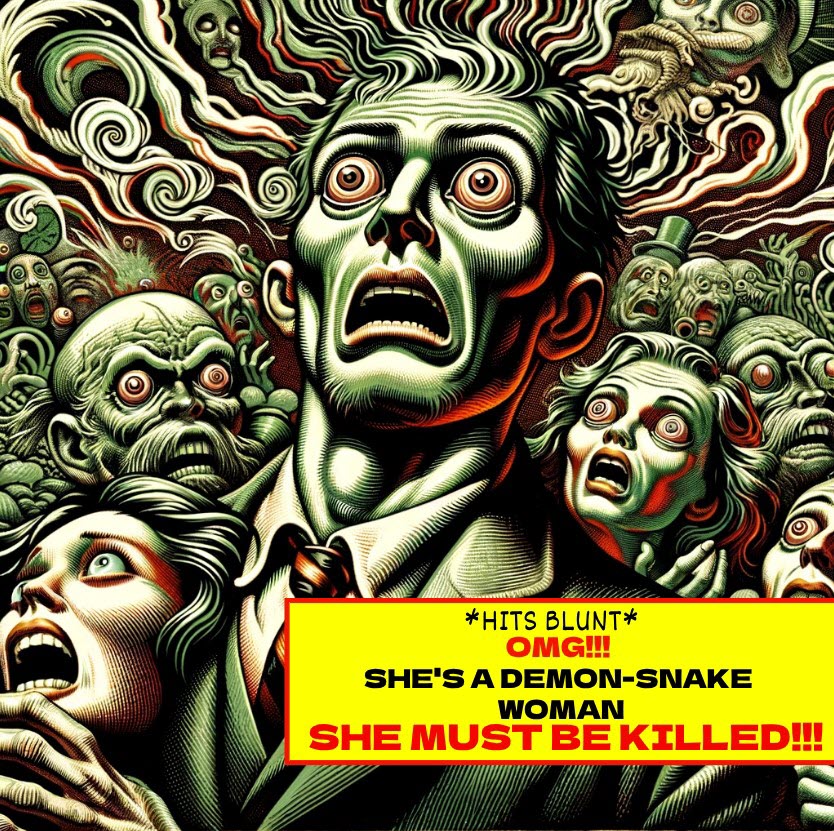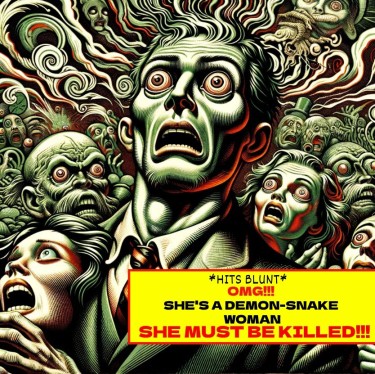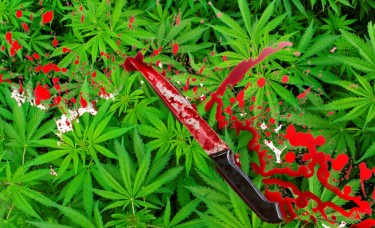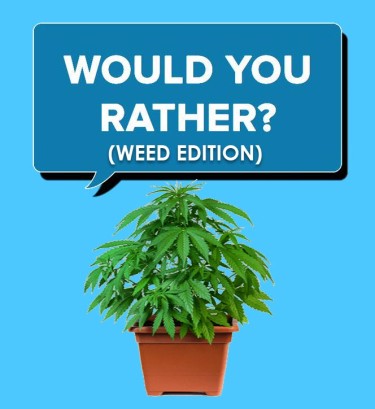Cannabis News
Murderers Are Now Blaming Cannabis for Their Killings
Published
2 months agoon
By
admin

As Predicted – Now Murderers are blaming weed for their killings!
THE RETURN OF REEFER MADNESS AND WHAT TO DO ABOUT IT
I knew this was going to happen, I wrote about it, I talked about it on a podcast recently – and like the stoner prophet I am…it happened! What you ask? Another killer used the “Weed made me do it” defense, but this time in Ireland.
Remember the Bryn Spejcher case I wrote about earlier? The California woman who violently stabbed her boyfriend and a dog over 100 times, then claimed “cannabis-induced psychosis” made her do it? She ended up getting just community service. I warned everyone then that by creating such a legal precedent, this “cannabis madness” defense would become increasingly common for violent criminals to exploit. It seems those warnings are now becoming a reality.
The latest case involves a man named Diego Costa Silva in Ireland. He decapitated his wife, claiming he believed she was possessed by a serpent due to “cannabis-induced psychosis” – and that he had to remove her head to kill the snake entity. Two psychiatrists backed up his insanity plea, testifying that Silva genuinely suffered delusions and hallucinations from heavy cannabis use, rendering him legally not guilty by reason of insanity for the grisly murder.
Both the prosecution and defense told the jury the evidence only points one way – that Silva cannot be held criminally responsible for his actions due to the cannabis-induced psychosis. It’s a carbon copy of the Spejcher case playbook of using supposed marijuana madness to justify heinous violence.
This is the disturbing trend I cautioned against. If we continue allowing such cannabis insanity defenses, where does it end? Schizophrenics, murderers, and other violent criminals will increasingly lean on this to ease their sentences or walk free altogether. And it provides ammunition for the government to further crack down on cannabis under the guise of public safety.
In this article, we’re going to explore these troubling cases in-depth and discuss what we as a society must do to stop this madness from spiraling out of control. The stakes are high – both for justice being served properly and the cannabis movement’s hard-fought progress staying on track. This budding legal loophole needs to go up in smoke before it’s too late.
Let’s first break down the disturbing Diego Costa Silva case in Ireland. Silva claimed he decapitated his wife Fabiola because he was suffering from “cannabis-induced psychosis” that made him believe she was possessed by a demonic serpent that he needed to kill by removing her head.
Two psychiatrists, Dr. Brenda Wright and Dr. Mark Joynt, testified that Silva’s heavy cannabis use caused him to develop a legitimate psychotic disorder involving delusions and hallucinations about his wife being a threat. They stated Silva did not understand the moral or legal wrongness of his grisly actions due to his impaired mental state.
Both the prosecution and defense agreed Silva could not be held criminally culpable due to this “cannabis-induced psychosis” – a convenient label that provided him with a legal insanity defense for literally beheading his wife.
The eerie parallels to the Bryn Spejcher case are overwhelming. Spejcher also relied on testimony from psychiatrists who claimed her history of cannabis use caused her to develop a “cannabis-induced psychosis” that compelled her to carry out the frenzied stabbing murders of her boyfriend and a dog over 100 times.
In both cases, psychiatrists were the determiners and enablers of these “weed madness” defenses being successfully deployed to secure enormously lenient treatment for horrific murders. Not behavioral psychologists who study abnormal patterns of thought and action. Not neuroscientists who investigate brain function and chemistry. But psychiatrists – the same professionals who have a financial incentive to legitimize loosely defined “disorders” to prescribe psychiatric drugs as treatment.
Does this sound like justice to you? Weed smokers, does this culture of unhinged violence fueled by the munchies sound familiar? Of course not! These are calculated legal defenses by criminals looking to play the system and get-out-of-jail-free cards enabled by pill-pushing psychiatrists.
The idea that smoking marijuana can induce temporary insanity so extreme that it causes otherwise normal people tolose touch with all moral reasoning and turn into deranged killing machines is patently absurd on its face. It perpetuates the discriminatory “Reefer Madness” myth that cannabis causes mental illness and violence – the exact opposite of mountains of medical evidence showing it is a safe substance for most people that does not induce psychosis or increase aggression.
There has been an influx lately of negative cannabis articles, alarmist “studies,” and other propaganda demonizing marijuana. Things that the government and anti-drug establishment have been pushing for over 50 years in some capacity, regurgitating the same old claims, but now trying to brand them as “new” problems with weed.
For those of us who have been writing and advocating in the cannabis space for over a decade, we can sense the steadily shifting tone and renewed pushback against legalization from the powerful entities that have existed to uphold prohibition – the UN, DEA, big pharma, law enforcement, and prison-industrial complex.
Dig into some of the foundational treaties that codified the global “War on Drugs,” and you’ll find suspicious linguistic choices like using the heading “Marijuana and Drugs” – subtly separating it from other substances as if it didn’t even belong grouped with them initially.
I’ve read accounts from historians and researchers speculating that cannabis was almost an afterthought addition to the Controlled Substances Act and UN drug conventions – a last-minute play to criminalize the most ubiquitously consumed “illegal” substance on earth.
This questionable legal status was then perversely exploited by governments worldwide to wage a militarized war on their own people under the patently false pretext of protecting us. Using the drug war as a thin veil to deprive citizens of bodily autonomy, personal freedom, and human rights, while enriching those in power: “You’re too idiotic to think for yourselves, you peasants!”
At least, that’s how this state-sanctioned oppression and plundering of communities can feel when you’re on the receiving end of a no-knock raid, watching families torn apart over a plant. We cannot allow this to go unchallenged yet again. We cannot afford to sit back complicit and silent like the generations before us who witnessed the most valuable crop on earth get insidiously stolen away.
Not this time. This latest resurrection of reefer madness propaganda and quietly escalating reversion to the failed policies of the past will be met with a fervent resistance. We will expose the motives and rigorously debunk the junk science being pushed by those threatened by the cannabis reformation.
It’s our duty as citizens to defy unjust laws. When tyranny appears, it never does so overtly with absolute force at first. That would spark an immediate and overwhelming backlash. Instead, it insidiously codifies itself into the legal system first, giving its oppression a veneer of legitimacy and “justification” for using force.
Those who engage in these authoritarian power grabs understand this well. They exploit the legal process to slowly tighten the vice of control over the populace. They commandeer institutions like the media to proliferate their narratives and propaganda. And they hijack law enforcement to criminalize competitors and dissenting voices, jailing them under the flimsiest of pretenses.
If the forces working to re-criminalize cannabis are successful at rolling back hard-won reforms through deceptive means like these “cannabis insanity” defenses, it will be a legal form of tyranny. One that strips us of our fundamental rights over our own consciousness and bodies under the guise of sham concerns like public safety.
We must resist this at all costs through peaceful, civic, and legal avenues first and foremost. Flooding the comments on every negative cannabis article. Calling out the fallacies and ulterior motives. Protesting unjust policies and laws. Using our voices, our voices, our wallets, and our votes to fight the injustice and rewrite the unjust laws in a credible way.
But if all that fails, and the tyranny persists in totalitarian fashion? Well, we must be willing to move beyond civility. Throughout history, unjust laws have required a form of mass civil disobedience to rectify grave injustices when the system becomes too corrupted to fix itself through proper channels alone.
I warned that the “cannabis made me do it” murder defense was going to become a disturbing trend, and unfortunately, I don’t think the Diego Costa Silva decapitation case will be the last grisly act pinned on the scapegoat of marijuana psychosis.
But now is the time for the cannabis community to get activated. To call out this bullshit for what it is – cynical manipulation of the legal system and public opinion. We cannot be passive spectators letting this theater of injustice play out unchallenged.
It’s time to claim our power as conscious consumers and citizens. If corporations support oppressive policies or peddle prohibitionist propaganda, we starve them of our money and find ethical alternatives. If politicians vote against our interests and freedoms, we vote them out.
We must draw a hard line in the sand and declare “Enough is enough!” We cannot buy into the lies and anti-cannabis hysteria anymore. Not after everything we’ve been through as a community to reform draconian marijuana laws through facts and truth.
Become free thinkers who scrutinize every claim and accusation. Build an unshakable personal understanding of this plant and its impacts grounded in objective research, not garbage inst-reefer scare tactics.
The future of cannabis legalization is ours to uphold, but only if we remain united, vocal, and defiant against any forces attempting to gaslight us back into the nightmarish days of reefer madness. This latest insanity plea loophole cannot be the spark that lets that smoldering $64 billion industry up in smoke.
MURDERING IN THE NAME OF WEED, READ ON…

MURDERING IN THE NAME OF CANNABIS – GET 100 DAYS COMMUNITY SERVICE!
You may like
-


Is Your Kid Smoking or Vaping Weed?
-


Press Release: PsychedelicNewsWire Named Official Media Sponsor of the 4th Annual Psychedelic Therapeutics and Drug Development Conference
-


Memorial Day’s best weed, prerolls, carts, and more 2024
-


Naps Done Right Can Make a Huge Difference
-


Michigan is selling more cannabis, but retailers are taking in less money
-


Can Marijuana Give A Break From All The Drama


Marijuana for recreational and medicinal purposes is becoming more widely available and simpler to purchase every day. Furthermore, opinions about the drug’s possible risks have changed as a result of recent legislative modifications, especially among young teenagers.
While proper use of marijuana can offer health benefits for specific conditions, inappropriate use can lead to a variety of problems. It can severely impact health, situational judgment, memory, coordination, and more.
Given that marijuana has rapidly become a much more commonly used drug among young people, it is crucial to recognize the main signs of marijuana use in teens to ensure their safety and well-being.
Statistics on Child Marijuana Use
Though the stats may surprise you, marijuana is the most often used narcotic among teenagers. Among children between the ages of 12 and 17, the National Center for Drug Abuse reports that:
– Nearly 44% have tried marijuana in their lifetime, up from 37% in 2019.
– 35% used marijuana in the past year.
– Almost 7% of 12th graders use marijuana daily.
Regretfully, eighth, ninth, and tenth kids are exposed to an alarmingly high level of marijuana. Early usage is problematic since those who start using earlier have a greater likelihood of heavier use later in life.
How THC Impacts the Brain
The active element in cannabis is tetrahydrocannabinol (THC), which produces the “high” associated with marijuana. THC can be ingested by smoking cannabis flowers, vaping concentrated forms, or eating THC-infused foods. THC impacts the brain by interfering with processes that are typically controlled by naturally existing endocannabinoids.
The brain grows from birth to the mid-twenties, and consuming marijuana at a young age can interrupt this important development. Early marijuana usage appears to influence brain development, according to recent research.
The effects of cannabis on the brain are extensive:
– Executive Functioning: Skills necessary for daily life, such as focus, memory, problem-solving, planning, reasoning, and emotional control, are compromised.
– Working Memory: The ability to remember and later recall or use information is reduced.
– Lingering Effects: The impact of cannabis use can last well beyond the period of intoxication. Even if someone smokes on a weekend, the effects can persist into the following week. Regular use leads to a persistent decline in executive functioning, working memory, and other cognitive areas.
Cannabis use interferes with the brain’s circuits, and it remains uncertain whether the brain can fully recover if marijuana use is discontinued.
Signs Your Child is Using Cannabis
Recognizing if your child is using marijuana can involve noticing various signs, including:
– Hair or clothes with a pungent marijuana smell
– Red or bloodshot eyes
– Delayed reaction times
– Mood swings
– Laziness and tiredness
– Presence of marijuana-related paraphernalia
– Paranoia or anxiousness
– Increased hunger or “munchies”
Visible Signs of Marijuana Use
Shortly after usage, marijuana’s effects can be perceived both visually and aromatically. It is very suggestive of marijuana usage if your adolescent returns home with red or bloodshot eyes. Physical and mental delays in response times and problems with muscular coordination are further symptoms.
Cannabis has a unique fragrance that is another warning clue; it is frequently characterized as having a pungent, musky smell like that of a skunk. On your teen’s clothes, this odor might cling rather readily.
Changes in Emotional State
The body and mind might react differently to different strains or varieties of marijuana. Teenage marijuana usage is frequently indicated by mood swings, lethargy, and general exhaustion in their day-to-day demeanor. Depending on how their body responds, they might also seem nervous and exhibit an elevated heart rate.
Your youngster may struggle to focus at job, school, or home as a result of these changes, which frequently results in subpar performance and grades. This decrease might be a clear indication that marijuana use has turned into an addiction.
Educating Your Child about Marijuana
Regardless of whether you suspect your child is using cannabis, it’s important to discuss it. Parents and caregivers should talk about all types of dangerous substances, including nicotine, alcohol, and cannabis, with children as early as elementary school.
It’s important to be proactive and talk to your youngster about the risks associated with marijuana. These talks may serve to deter marijuana usage or at the very least postpone the initial experience until the mid-20s, when the brain is more completely matured.
As teenagers become older, their need for independence grows, which makes it harder for parents to control their actions. Still, parents need to persevere. It is significantly more dangerous to consume cannabis than it is uncomfortable to have a difficult talk.
Addressing Marijuana Use and Seeking Help
For teenagers’ wellbeing, it is essential to identify and treat marijuana usage. It’s crucial to handle the matter with compassion and support if you think your child may be consuming marijuana. Discussing its usage, the rationale behind it, and any possible hazards should come first in an honest and nonjudgmental discussion. Give your child access to a secure environment where they may talk about their thoughts and experiences. You can gain insight into their viewpoint and advice on how to make better decisions by having this discussion.
If using marijuana has become troublesome, you might think about getting professional assistance. Resources like therapists, counselors, and specialty treatment programs can provide your kid with the help they need. These specialists are qualified to deal with underlying problems including stress, peer pressure, or mental health disorders that may be causing drug use. Early intervention can stop the usage from getting worse and support your kid in creating healthy coping mechanisms. Getting a medical expert involved can also offer a methodical way to handle the matter and guarantee that your adolescent gets the treatment they need.
It is critical to be involved and supportive throughout the process. Encourage your kid to participate in activities that support their well-being and offer positive reinforcement for good habits. Stay educated about the services available in your area, and consider joining support groups for parents struggling with similar challenges. You can assist your child in navigating this difficult period and promote a healthy, drug-free future by keeping open communication and obtaining expert support as required.
Bottom Line
Parents need to be vigilant about the signs of marijuana use in their children, given its prevalence among teenagers and its potential impact on their health and development. Early detection, open communication, and seeking professional help if needed are key strategies for addressing marijuana use in adolescents. By providing support, education, and access to resources, parents can help guide their children towards healthier choices and a drug-free future.
HOW TO HAVE “THE TALK” WITH YOUR KIDS, READ ON..
Cannabis News
How Did Hidden Leaf Cannabis Become the Leader of the Ontario Marijuana Market?
Published
2 days agoon
May 17, 2024By
admin

Cannabis.net sat down with Ontario’s hottest cannabis store to find out some of their “secret sauce” that made them the best dispensary in Ontario, Canada.
Q: How did you come up with the name Hidden Leaf for Ontario’s premier cannabis dispensaries?
A: Growing up, I was always a big fan of the anime show Naruto, where the main character grew up in a village called “Hidden Leaf Village.” Naruto’s backstory really resonated with me, inspiring me to name the company Hidden Leaf. As Ontario’s premier Burlington and Scarborough Dispensary, we strive to embody the spirit of community and resilience found in Naruto’s tale.
Q: What makes Hidden Leaf the best dispensary in Scarborough or Burlington?
A: At Hidden Leaf, customer service sets us apart. Unlike many other dispensaries that curate their menu based on profitability, our customers drive our selection. We actively encourage our patrons from both our cannabis store Scarborough and cannabis store Burlington to send in their product recommendations, which we try our best to stock. Plus, we offer the most competitive pricing, making cannabis affordable for everyone. Our commitment to these principles makes us stand out in the Scarborough dispensary and Burlington dispensary markets.
Q: How did you first get into the Canadian cannabis market? What made you take the leap of faith?
A: From a young age, I’ve always wanted to own a business and had a passion for the cannabis industry, learning to grow plants and understanding the different types of concentrates. Taking the risk to enter the business felt right as it was a great way to expand my knowledge and participate actively in the burgeoning cannabis market in cities like Scarborough and Burlington.
Q: Canada was the first G7 country to legalize weed, what advice would you look back and give your past self? What do you wish you knew then that you know now?
A: Looking back, I wish I had learned more about the cannabis business earlier and entered the industry as soon as it was legalized. Now, understanding the different avenues to enter the cannabis industry, I would definitely consider owning my own grow facility among other ventures. This knowledge would have been invaluable from the start, especially in dynamic markets like those of our Cannabis Store Burlington and other locations.
Q: What are Hidden Leaf’s best strains, or what do customers come back for over and over?
A: Hidden Leaf carries a wide variety of brands and strains to cater to every customer’s needs. From budget-friendly options for those looking to save a few bucks to premium quality strains for the real cannabis connoisseurs, our selection is vast. Customers frequently return for our consistent quality and the breadth of our offerings, including popular cannabis flowers at both our Scarborough and Burlington locations.
Q: What has been the biggest challenges in setting up a cannabis business in Canada?
A: The biggest challenge has been finding the right location. Despite legalization, there’s still a stigma around cannabis with many landlords, making it hard to lease properties for cannabis businesses. Additionally, the market is quite saturated with many retailers opening up, so it’s crucial to choose strategic locations for our dispensaries to avoid excessive competition, particularly in areas served by our Scarborough dispensary and cannabis store Burlington.
Q: What do you think about the future of cannabis beverages?
A: The future of cannabis beverages and edibles is very promising. Many people who are new to cannabis are not fans of smoking, so THC beverages and edibles offer a fantastic alternative. These products are expected to attract a new wave of consumers looking to explore cannabis in a more familiar and accessible form.
Q: What is the best way for people to find out more about us or visit us? Website? Social media?
A: The best way for customers to find out more about Hidden Leaf is through our website. It’s the go-to place to find the closest location, whether that’s our Scarborough dispensary or cannabis store Burlington, and to explore our menu and pricing. Our website is a comprehensive resource for anyone interested in our products and services.
Q: If someone is trying to decide which dispensary to go to in Ontario, why should they go to Hidden Leaf?
A: At Hidden Leaf, it’s all about customer service and pricing. We don’t believe in upselling; instead, our goal is to find the best product within your budget. Our customers help shape our menus with their recommendations, which we order in every week. With very competitive pricing, we believe cannabis should be affordable for everyone, making our Burlington and Scarborough Dispensary the go-to choice for quality cannabis products and genuine customer care.
Cannabis News
Are You Bored So You Smoke Weed or Do You Smoke Marijuana and Get Bored?
Published
2 days agoon
May 17, 2024By
admin

Cannabis and Boredom
Boredom is a universal human experience characterized by a lack of interest, motivation, or engagement in one’s current activities. It is a state of mind that can leave individuals feeling restless, apathetic, and dissatisfied.
But why do people get bored?
Research suggests that boredom serves a vital function within the life of the individual, acting as a signal that one’s current situation is unfulfilling and that change is needed.
Boredom can be a catalyst for personal growth and development. When faced with monotony, the mind yearns for stimulation and seeks out new experiences.
This innate drive pushes individuals to explore new hobbies, learn new skills, and challenge themselves in ways that promote self-improvement. In this sense, boredom can be seen as a motivational force that encourages people to break free from stagnation and pursue meaningful goals.
However, in today’s fast-paced, instant-gratification society, many individuals struggle with the discomfort of boredom and seek quick fixes to alleviate its symptoms.
A recent Reddit post posed the question, “Do you use cannabis to escape boredom, or does cannabis make you content with being bored?” This query highlights a common trend among cannabis users who turn to the substance as a means of coping with idle moments.
In this article, we will explore the concept of “escaping boredom” through cannabis use and examine the potential pitfalls of relying on the substance as a sole means of entertainment.
We will also delve into the function of boredom within the life of the individual and discuss how cannabis, when used mindfully, can be a tool for enhancing focus and productivity rather than a mere distraction from tedium.
Boredom, often perceived as a negative emotional state, has been the subject of numerous studies that highlight its potential benefits for personal growth. A study conducted by Mann and Cadman (2014) found that engaging in boring tasks can stimulate creativity and problem-solving abilities. The researchers suggest that when the mind is not occupied with external stimuli, it tends to wander and generate novel ideas.
Similarly, Gasper and Middlewood (2014) discovered that boredom can lead to increased motivation and goal-directed behavior, as individuals seek to alleviate the unpleasant state by pursuing meaningful activities.
However, boredom can become toxic when it is chronic or excessive. Prolonged periods of boredom have been linked to negative outcomes such as depression, anxiety, and substance abuse (Eastwood et al., 2012).
When individuals lack the skills or resources to cope with boredom in a constructive manner, they may turn to maladaptive behaviors as a means of escape. This can create a vicious cycle where the temporary relief provided by these behaviors reinforces their continued use, leading to further disengagement from life’s challenges and opportunities.
So, what’s the secret to never being bored? The answer lies in cultivating a curious and engaged mindset. Individuals who approach life with a sense of wonder and a desire to learn are less likely to experience boredom, as they find joy and meaning in even the most mundane tasks.
By setting goals, pursuing hobbies, and seeking out new experiences, one can maintain a sense of purpose and fulfillment that keeps boredom at bay.
As a regular cannabis smoker myself, I can attest to the fact that it is possible to lead a stimulating and engaging life while still enjoying the benefits of the plant. In the next segment, I will share my personal secret for using cannabis as a tool for enhancing focus and creativity rather than as a means of escaping boredom.
By mindfully integrating cannabis into a balanced and purposeful lifestyle, individuals can harness its potential for personal growth and avoid falling into the trap of chronic boredom.
As a seasoned cannabis enthusiast, I’ve come to understand that the key to overcoming boredom lies not in escaping it, but in embracing it.
The first step is to recognize that the anxiety associated with boredom is not inherently negative. Instead, it is an opportunity for self-reflection and growth. By becoming comfortable with boredom, you open yourself up to new possibilities and experiences.
One of the most common mistakes that stoners make is relying solely on cannabis for entertainment. While cannabis can certainly enhance many activities, it is essential to find something to pursue that isn’t related to smoking.
This requires honest introspection and a willingness to explore your interests and passions. Take the time to reflect on what truly excites and motivates you, and don’t be afraid to step outside your comfort zone.
When pursuing new activities, it’s crucial to focus on the process rather than the outcome. In our fast-paced, instant-gratification society, we often fixate on the end result and lose sight of the joy found in the journey itself.
By falling in love with the process of doing, you can find fulfillment and satisfaction in the present moment, regardless of the ultimate outcome. The goal should serve as a guiding light, but the real magic happens in the day-to-day efforts you put forth.
Once you discover an activity that genuinely captivates you, cannabis can become a tool for enhancing the experience rather than a means of escaping boredom. When you’re engaged in something you love, smoking cannabis can heighten your focus, creativity, and enjoyment without hindering your productivity.
If you find yourself frequently bored and turning to cannabis as a crutch, take a step back and ask yourself, “What would I really like to be doing right now?” Allow your mind to explore various possibilities and jot down any ideas that come to mind.
From this list, identify an activity that isn’t passive or cannabis-related, and make a conscious effort to dedicate your “bored” moments to pursuing this interest.
As you begin to focus on this newfound passion, you’ll notice that cannabis no longer serves as an escape from boredom but rather as a complement to your engaging pursuits. You’ll find yourself sparking a joint and diving into your work with renewed enthusiasm and focus.
Remember, the key to beating boredom as a stoner lies in embracing it as an opportunity for self-discovery and personal growth. By finding something you truly love and immersing yourself in the process, you can transform those once-dreaded moments of boredom into a catalyst for a more fulfilling and satisfying life.
As we conclude this exploration of cannabis and boredom, it’s essential to acknowledge that the temptation to use cannabis as an escape from boredom is understandable, particularly for young people who are still discovering their identity and purpose in life.
In a world that moves at breakneck speed, it’s easy to fall into the trap of seeking instant gratification and quick fixes for even the most mundane tasks.
However, it’s crucial to recognize that the fast-paced nature of our society has transformed our minds into dopamine-addicted entities, constantly craving the next hit of excitement or stimulation. This mindset can lead to a vicious cycle of unfulfillment and dissatisfaction, as we become increasingly reliant on external sources of pleasure to combat boredom.
The key to breaking free from this cycle lies in embracing difficulty and challenging ourselves to grow. By engaging in activities that push us beyond our comfort zones and require us to learn new skills, we can cultivate a sense of achievement and fulfillment that goes beyond fleeting moments of pleasure.
This process of overcoming obstacles and mastering new abilities reinforces our motivation to continue pursuing personal growth and development.
Ultimately, boredom is a weapon that can be wielded for good or ill, depending on how we choose to frame it. Rather than allowing boredom to dominate our lives or turning to cannabis as a means of escape, we must learn to harness its power and mold it into a tool for positive change. By embracing boredom as an opportunity for self-reflection, exploration, and growth, we can transform those moments of restlessness into catalysts for personal transformation.
So, to all the cannabis enthusiasts out there, I encourage you to view boredom not as an enemy to be vanquished but as an ally in your quest for a more fulfilling and purposeful life. Don’t let cannabis become a crutch that holds you back from reaching your full potential. Instead, use it as a tool to enhance your experiences and complement your passions.
Armed with this newfound perspective, go forth into the world with confidence and determination. Embrace the challenges that come your way, and use them as stepping stones to greatness.
Let boredom be your guide, leading you towards a life filled with meaning, purpose, and endless possibilities. And when you do choose to indulge in cannabis, do so not as an escape from reality but as a celebration of the incredible journey you’re on.
In the end, the sticky bottom line is this: Life is too short to be bored. So light up that joint, kick some ass, and take some names along the way. The world is yours for the taking, and with the right mindset, there’s nothing you can’t achieve.
STONED AND BORED, READ ON…
WOULD YOU RATHER… THE GAME TO PLAY WHEN YOU ARE STONED AND BORED!

Is Your Kid Smoking or Vaping Weed?

Press Release: PsychedelicNewsWire Named Official Media Sponsor of the 4th Annual Psychedelic Therapeutics and Drug Development Conference

Memorial Day’s best weed, prerolls, carts, and more 2024

Naps Done Right Can Make a Huge Difference

Michigan is selling more cannabis, but retailers are taking in less money

Can Marijuana Give A Break From All The Drama

Consumer Spending Validates Marijuana Rescheduling

How Did Hidden Leaf Cannabis Become the Leader of the Ontario Marijuana Market?

Are You Bored So You Smoke Weed or Do You Smoke Marijuana and Get Bored?

Cannabis Rescheduling Takes The Next Steps

Distressed Cannabis Business Takeaways – Canna Law Blog™

United States: Alex Malyshev And Melinda Fellner Discuss The Intersection Of Tax And Cannabis In New Video Series – Part VI: Licensing (Video)

Drug Testing for Marijuana – The Joint Blog

What you Need to Know

Cannabis, alcohol firm SNDL loses CA$372.4 million in 2022

NCIA Write About Their Equity Scholarship Program

City Of Oakland Issues RFP For Employee Training Programs

It has been a wild news week – here’s how CBD and weed can help you relax

A new April 20 cannabis contest includes a $40,000 purse

UArizona launches online cannabis compliance online course
Trending
-

 Cannabis News1 year ago
Cannabis News1 year agoDistressed Cannabis Business Takeaways – Canna Law Blog™
-

 One-Hit Wonders1 year ago
One-Hit Wonders1 year agoUnited States: Alex Malyshev And Melinda Fellner Discuss The Intersection Of Tax And Cannabis In New Video Series – Part VI: Licensing (Video)
-

 drug testing5 months ago
drug testing5 months agoDrug Testing for Marijuana – The Joint Blog
-

 Cannabis 1011 year ago
Cannabis 1011 year agoWhat you Need to Know
-

 Marijuana Business Daily1 year ago
Marijuana Business Daily1 year agoCannabis, alcohol firm SNDL loses CA$372.4 million in 2022
-

 Education1 year ago
Education1 year agoNCIA Write About Their Equity Scholarship Program
-

 Education1 year ago
Education1 year agoCity Of Oakland Issues RFP For Employee Training Programs
-

 Cannabis1 year ago
Cannabis1 year agoIt has been a wild news week – here’s how CBD and weed can help you relax





